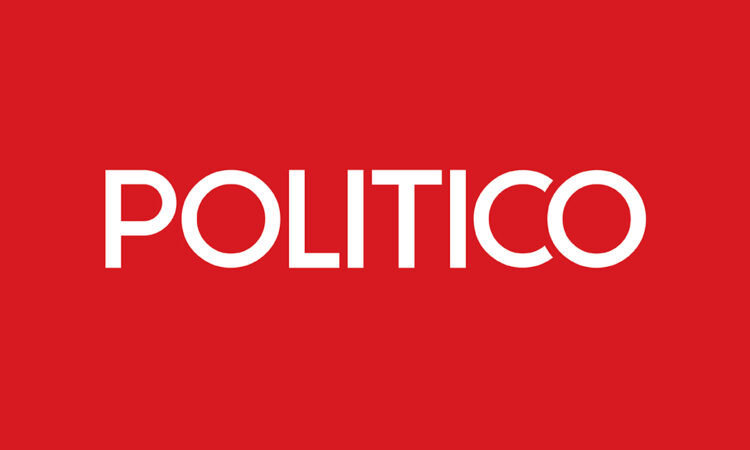
Editor’s note: Morning Money is a free version of POLITICO Pro Financial Services morning newsletter, which is delivered to our subscribers each morning at 5:15 a.m. The POLITICO Pro platform combines the news you need with tools you can use to take action on the day’s biggest stories. Act on the news with POLITICO Pro.
The fight between California and Washington over who should regulate artificial intelligence is heating up. Startups are caught in the crosshairs.
Company founders worry that leaving it up to individual states to impose guardrails on AI would create a disjointed regulatory landscape that would make it more difficult for firms to operate. That could curb investment and innovation at a time when China and other competitors are looking to close the gap in AI technology. Fledgling startups would be hit much harder than deep-pocketed AI giants OpenAI, Google and Meta.
Many founders say they would prefer a federal standard. But Washington has been slow to act despite releasing an “action plan” in July. By contrast, California, home to 32 of the top 50 AI companies, is moving quickly. On Monday, Gov. Gavin Newsom, who is considering a presidential run in 2028, signed a bill that would require large AI developers to disclose safety protocols and report incidents.
Other states, including Colorado, New York and Texas, passed their own AI-related legislation this year, measures targeting deepfakes and misinformation, transparency around privacy and data use. That sets up a patchwork of state rules which would hamper the industry’s growth, executives say.
“It could freeze startups’ own investments because it changes the economics of moving forward,” said Dorna Moini, CEO of Gavel, an AI and automation suite for lawyers backed by an OpenAI executive. “Investors might hesitate to back smaller AI companies if exit valuations are going to be discounted by all these compliance risks.”
An exit valuation is a crucial metric for investors that calculates the amount of money they receive from the startup when it is sold. State officials say they have no choice but to fill the vacuum left by the federal government.
“California has an important role to play because the federal government, thus far, has abdicated its role,” Jason Elliott, state policy expert and former deputy to Newsom, said.
A senior White House official told MM: “This is a national security and federal issue and not something we let California or a bunch of blue states determine.”
Republicans in Congress also want to put the brakes on California and other states. Lawmakers sought to include a ban on state AI rules in the megabill Congress passed over the summer. Texas Republican Sen. Ted Cruz has promised to push the proposal again, adding to the uncertainty.
Company founders “are in a real political pickle,” said Adam Thierer, Senior Fellow at R Street Institute. “Companies prefer a federal standard – on the other hand they know it’s extremely difficult for Washington to get the job done when it comes to any technology policy issue. Therefore, you’re left with the dreaded so-called California effect.”
The California effect refers to a dynamic where stricter policy set by the state may influence regulation across the country.
“It doesn’t matter where it comes from, but regulation needs to happen,” entrepreneur and investor Asheesh Birla said, pointing out that technology doesn’t have state borders. “Ideally it should happen at the federal level. We need a clear framework for big institutions and small alike.”
At stake are hundreds of billions of dollars in investment as well as leadership in the AI arms race between the U.S. and China.
Morgan Stanley estimates total investment in AI data center infrastructure, fueled by spending on AI, will hit nearly $500 billion this year. That number is projected to rise to $920 billion in 2028, the firm says.
AI deals also accounted for almost two thirds of venture capital funding through September this year, according to Pitchbook.
“All of venture funding is going into AI companies right now,” Gil Luria, Head of Technology Research at investment firm D.A. Davidson. “That funding may cool off or be more limited if there are significant restrictions on the reach of AI and the type of capabilities it can have.”
Right now, big tech firms account for much of the investment in the sector. Analysts expect they will be less affected by regulatory obstacles.
“The economic impulse is so strong that a little bit of extra friction around the edges with regulation is not going to stop it,” said entrepreneur and AI consultant Raj Gajwani.
It’s a different story for the little guys.
“The quintessential American garage startup founders will definitely see some of their margins shrink,” said Kristian Stout, Director of Innovation Policy at the International Center for Law & Economics. “There’s a good likelihood that it’ll drive some talent offshore.”
“California has always been about rule breakers and innovation,” said Dominique Van Winther, Final Upgrade AI CEO. “But if it’s going to be crippled by high barriers to entry then we’re going to end up with a conglomerate of large AI companies with no room for the startups.”
It’s WEDNESDAY — Send your AI investment takes to [email protected]. And as always, you can reach Sam at [email protected] with all your econ policy thoughts, Wall Street news, personnel moves or general insights.
Senate Finance holds a hearing on taxing digital assets at 10 a.m.
Shutdown — The federal government has shut down and that means, among other things, the September jobs report that investors and employers are relying on will not be released, our friends at Morning Shift report.
The freeze is rattling economists who were already uneasy about the recent leadership turmoil at the Bureau of Labor Statistics after Trump fired the Biden-appointed commissioner, Erika McEntarfer.
— Republicans might be united on the public stage as they face off with Democrats ahead of a government shutdown. But the year-end expiration of health insurance subsidies first created under the Affordable Care Act is already splitting the GOP, our Meredith Lee Hill reports.
— The Department of Housing and Urban Development has a large banner blaming the “radical left” for the government shutdown that will “inflict massive pain on the American people unless they get their $1.5 trillion wish list of demands,” Katherine Hapgood reports.
— Trump is unconcerned that Americans could sour on him and the GOP when it comes to the government shutdown. “The Democrats are deranged,” the president said during a brief phone call with POLITICO, Dasha Burns reports.
— ICYMI, the National Flood Insurance Program, which millions of homeowners use to protect against costs from storm damage to their properties, is set to lapse along with government funding, reports Jasper Goodman.
Quintenz is out — The White House withdrew Brian Quintenz’s beleaguered nomination to chair the Commodity Futures Trading Commission late Tuesday, after cryptocurrency billionaires Tyler and Cameron Winklevoss pressed Trump to reconsider his nomination, Meredith Lee Hill and Declan Harty report.
— A White House official called Quintenz, a former CFTC commissioner who has worked for Andreessen Horowitz’s crypto fund and prediction market startup Kalshi, a “trusted ally,” before adding that the administration “looks forward to working with him in other capacities.”
— As for what’s next? The official said Trump will name a new nominee “in the near future,” and the vetting is already underway. Among those in the mix: Mike Selig, chief counsel of the SEC’s crypto task force; Tyler Williams, Treasury Secretary Scott Bessent’s crypto adviser; former CFTC official Josh Sterling; and former CFTC Commissioner Jill Sommers, per people familiar with the discussions.
Also out — The White House is withdrawing the nomination of E.J. Antoni to lead the Bureau of Labor Statistics amid criticism of the pick from across the political spectrum, Meredith, Sam Sutton and Lawrence Ukenye report.
“Dr EJ Antoni is a brilliant economist and an American patriot that will continue to do good work on behalf of our great country,” a White House official said in an emailed statement.
The free hand — Trump announced that his administration has struck a deal with pharmaceutical giant Pfizer to sell its drugs at lower prices to Medicaid patients, reports David Lim.
’Semiconductor Slush Fund’ — A $7.4 billion tech initiative devised as the linchpin of America’s semiconductor resurgence is in limbo after the Commerce Department yanked its funding, Christine Mui reports.
Steady as she goes — Trump’s approval ratings hold steady despite policy pushes by his administration that are unpopular with voters, according to a NYT/Siena poll, Jacob Wendler reports.
— Voters gave Trump poor marks on the economy, but 72 percent of those who reported voting for the president in 2024 said the economy has performed better since he took office. That’s a significant improvement from the NYT/Siena poll taken in April.
— The Senate Banking Committee advanced several of Trump’s picks to staff senior roles at the Treasury and Housing and Urban Development departments, Michael Stratford reports.
Affinity — Video gaming giant Electronic Arts has inked a $55 billion deal to go private, led by Saudi Arabia’s Public Investment Fund, Silver Lake and Jared Kushner’s Affinity Partners. Silver Lake’s Egon Durban had his eye on acquiring EA for years, but the timing for the deal was never right, according to the Wall Street Journal.
— Trump’s son-in-law played a pivotal role in the EA buyout deal. Bloomberg reports that Jared Kushner brokered the initial connection between the video gaming company and Saudi Arabia’s Public Investment Fund and “for months acted as a central figure in the talks.”
Hard to unwind — Reforming Fannie Mae and Freddie Mac is likely to come at a cost to home buyers, whether the housing giants remain in conservatorship or not, according to new research from former Biden economist Daniel Hornung — now a senior fellow at the Stanford Institute for Economic Policy Research — and Ben Sampson. Hornung and Sampson found that the policy options that have been floated would cause mortgage rates to rise by between 0.2 to 0.8 percentage points, which would correspond to between $500 and $2,000 in house payments per year for the typical buyer.




